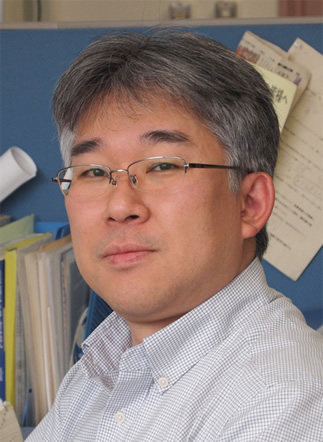- Home
- Purpose and Features
- Message from the coordinator
Program Coordinator
Hokkaido University, Faculty of Veterinary Medicine
Motohiro HORIUCHI
Message from the Program Coordinator
 Zoonosis and emerging and re-emerging infectious diseases, such as influenza, Ebola hemorrhagic fever, tuberculosis, and antimicrobial-resistant bacterial infections appear one after another and threaten public health. Transboundary animal infectious diseases, such as foot-and-mouth disease and classical swine fever, cause severe economic damage once they enter. Hazards chemicals discharged into environment that include poisonous metals, pollutants such as dioxin, and persistent organic pollutants, are known to have caused global-scale contamination and threaten the health of humans and animals. Health and socio-economic problems by infectious diseases and hazardous chemicals are continuously occurring. Contemporary humans, who have been receiving lives of convenience, are obliged to pass soundness and integrity of living environments on to the next generations. There are many diseases such as cancer, urological and neurological disorders, which are commonly observed in humans and animals, other than infectious diseases. Based on the concept that researches on physiological difference and similarity of diseases greatly contributes to both human and animal health, “Zoobiquity”, which proposes the reinforcement of collaboration between medicine and veterinary medicine, is recently drawing international attention.
Zoonosis and emerging and re-emerging infectious diseases, such as influenza, Ebola hemorrhagic fever, tuberculosis, and antimicrobial-resistant bacterial infections appear one after another and threaten public health. Transboundary animal infectious diseases, such as foot-and-mouth disease and classical swine fever, cause severe economic damage once they enter. Hazards chemicals discharged into environment that include poisonous metals, pollutants such as dioxin, and persistent organic pollutants, are known to have caused global-scale contamination and threaten the health of humans and animals. Health and socio-economic problems by infectious diseases and hazardous chemicals are continuously occurring. Contemporary humans, who have been receiving lives of convenience, are obliged to pass soundness and integrity of living environments on to the next generations. There are many diseases such as cancer, urological and neurological disorders, which are commonly observed in humans and animals, other than infectious diseases. Based on the concept that researches on physiological difference and similarity of diseases greatly contributes to both human and animal health, “Zoobiquity”, which proposes the reinforcement of collaboration between medicine and veterinary medicine, is recently drawing international attention.
To ensure the critical concept of this program “One Health”, multi-disciplinary collaboration such as medicine, veterinary medicine, and environmental science, and trans-sectoral cooperation with human and animal health sectors, education, research and development institutions, and risk management authorities, in other words, “One Health Approach”, is essential. In this program, we promote advanced researches using excellent research and human resources and outstanding experiences on infectious diseases, chemical hazard, and animal and life sciences for contributing One Health. Additionally, PhD course students will gain a variety of experiences of international collaborative research with reliable counterparts, cooperative activity with international organization such as WHO, OIE, and JICA, and/or development research in collaboration with public institution and company. This program aims at fostering professional/expert (superior PhD) who will be able to tackle and resolve problems related to One Health, with a definite idea for disease control and prevention, a holistic viewpoint, a well-balanced international sense, and a comprehensive competence for decision-making and problem-solving.
